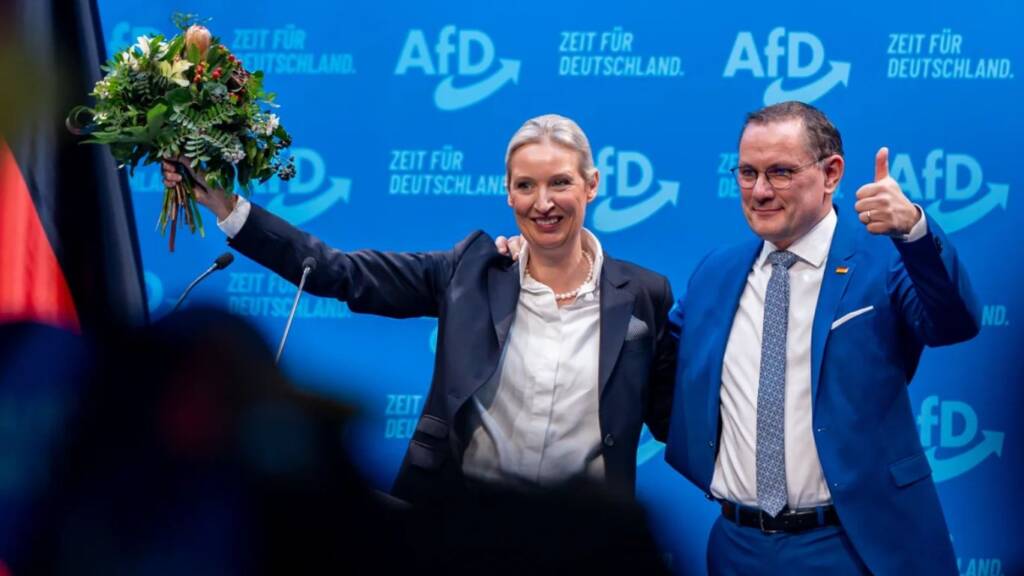For many years, German political parties have kept the far-right party AfD away from power and major roles in parliament. This effort to block the AfD is known as Germany’s “firewall” against the far-right. But now, this firewall seems to have weakened. AfD, once facing a threat of ban in German society by mainstream political parties, has made its position by achieving the second largest vote share in the recent German election.
The change comes as the AfD gains more public support. Many believe that blocking the AfD only helps the party play the victim card and win more sympathy. The AfD is no longer a fringe party — it is becoming a major force in German politics.
In the 2025 German elections, the far-right party AfD became the second-largest party. It won 20.8% of the vote and secured 152 seats in the Bundestag. A recent survey also shows the AfD is now the most popular party in Germany. It polled 25%, while the CDU/CSU bloc, led by likely future Chancellor Friedrich Merz, polled 24%.
Also Read: Germany election farce, Scholz & Merz join forces to sideline AfD?
The AfD’s growing strength is forcing other parties to rethink their approach. With its 152 seats, the AfD is entitled to chair some parliamentary committees. Until now, other parties worked together to block the AfD from getting such roles. The AfD was also kept away from the parliamentary vice president post. But this might soon change.
Inside the CDU/CSU bloc, some leaders are now open to working with the AfD. They offer two reasons for this. First, they say AfD voters cannot be ignored. Keeping the party out of parliament work will only push these voters further away.
Jens Spahn, a senior CDU leader, told Bild that the AfD should be treated like any other opposition party during parliamentary work. He also said that the AfD’s strong performance shows voters want their concerns heard, and parties must take them seriously.
The second reason is that the boycott helps the AfD play the victim card. Johann Wadephul, deputy leader of the CDU/CSU parliamentary group, told RND that the boycott only makes the AfD look like a victim. He said if AfD lawmakers have no bad record, they should be allowed to chair committees. Parliament functions with numbers, and AfD got the numbers to be included in the parliamentary work.
Some CDU leaders hope giving AfD more public responsibility will change public opinion. They believe that once people see AfD members in action, they might not like them as much. This is seen as a strategy to limit the party’s future growth. However, he forgot that the people’s love for the party can be seen in the election result.
Over time, some AfD politicians have quietly built ties with members of other parties. AfD officials also told media that they have seen signs of support behind closed doors.
However, many leaders still strongly oppose working with the AfD. Not everyone in CDU/CSU is ready to accept the party. Lawmaker Roderich Kiesewetter told RBB that AfD lawmakers are a “security threat” to Germany. However, these leaders do not explain what kind of security threat Germany is getting from AfD. He said they should not be allowed in sensitive committees like those overseeing the intelligence services.
The SPD, the CDU’s coalition partner, is also against the AfD’s rise. SPD’s Katja Mast told Tagesspiegel that the AfD is not a normal party and that the SPD will defend democratic institutions from it. In the name of defending democratic institutions, SPD is taking undemocratic procedures to handle AfD. This action itself undermines the German democratic institution, the Bundestag, as AfD is a bigger party than the SPD in the parliament.
One more roadblock still exists. The coalition agreement between CDU/CSU and SPD clearly says there must be no cooperation with the AfD “at any political level,” according to Euractiv. If they do so, the vote share and support for AfD is definitely going to increase in German society in the coming years.
